Meteor Shower Time: The Geminids!
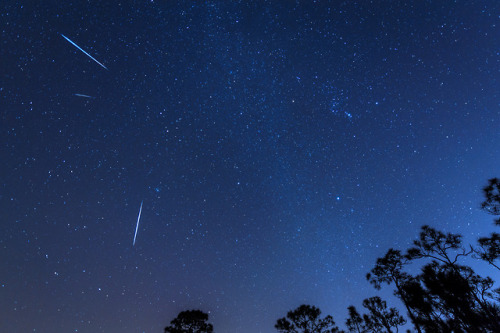
Meteor Shower Time: The Geminids!
The biggest rival of the Perseid meteor shower has arrived! The Geminids which has a reputation for the enormous about of meteors it produces peaks Friday the 14th. This shower often gets overlooked due to the fact that much of the Northern Hemisphere is freezing its buns off during this time. But if you are somewhere warm… or even have a decent sized window, you will want to give this one a shot.
Read the full post to see how to catch it
More Posts from Monstrous-mind and Others

Spotted: signs of a planet about 28 million light-years away 🔎 🪐
For the first time, astronomers may have detected an exoplanet candidate outside of the Milky Way galaxy. Exoplanets are defined as planets outside of our Solar System. All other known exoplanets and exoplanet candidates have been found in the Milky Way, almost all of them less than about 3,000 light-years from Earth.
This new result is based on transits, events in which the passage of a planet in front of a star blocks some of the star's light and produces a characteristic dip. Researchers used our Chandra X-ray Observatory to search for dips in the brightness of X-rays received from X-ray bright binaries in the spiral galaxy Messier 51, also called the Whirlpool Galaxy (pictured here). These luminous systems typically contain a neutron star or black hole pulling in gas from a closely orbiting companion star. They estimate the exoplanet candidate would be roughly the size of Saturn, and orbit the neutron star or black hole at about twice the distance of Saturn from the Sun.
This composite image of the Whirlpool Galaxy was made with X-ray data from Chandra and optical light from our Hubble Space Telescope.
Credit: X-ray: NASA/CXC/SAO/R. DiStefano, et al.; Optical: NASA/ESA/STScI/Grendler
Make sure to follow us on Tumblr for your regular dose of space!
📚📖🍁🍂🌌☕🎃

By Khanh Do
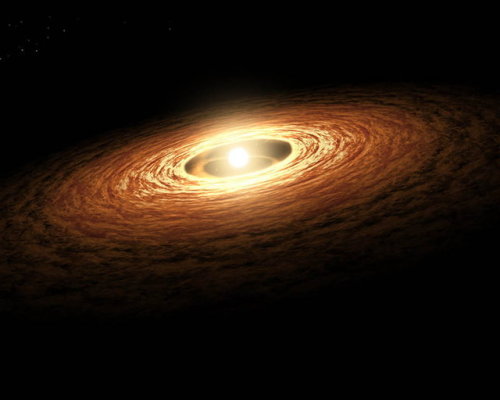
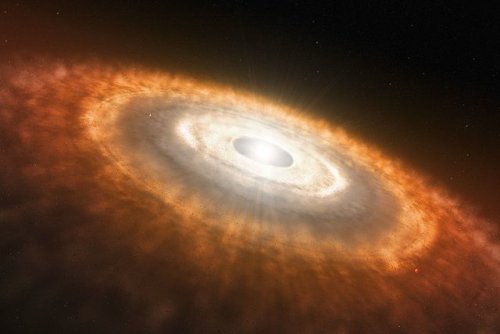
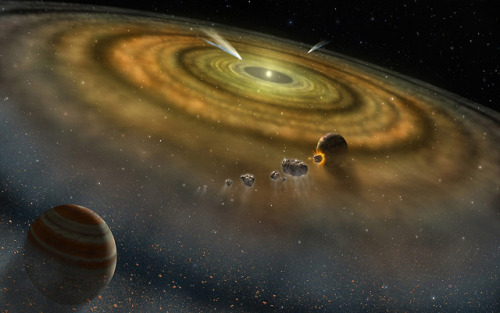
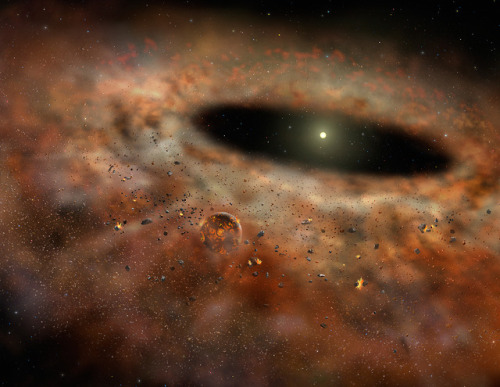
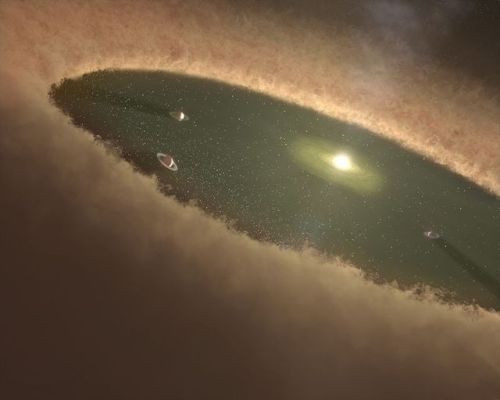
A protoplanetary disk is a rotating circumstellar disk of dense gas and dust surrounding a young newly formed star, a T Tauri star, or Herbig Ae/Be star. The protoplanetary disk may also be considered an accretion disk for the star itself, because gases or other material may be falling from the inner edge of the disk onto the surface of the star. This process should not be confused with the accretion process thought to build up the planets themselves. Externally illuminated photo-evaporating protoplanetary disks are called proplyds.
The nebular hypothesis of solar system formation describes how protoplanetary disks are thought to evolve into planetary systems. Electrostatic and gravitational interactions may cause the dust and ice grains in the disk to accrete into planetesimals. This process competes against the stellar wind, which drives the gas out of the system, and gravity (accretion), which pulls material into the central T Tauri star.
source
Image credit: NASA/JPL, ESO
🍁🍂🎃🍂🍁

Autumn Alley, Germany …..by Michael Boehmlaend
🍂🍁🎃🐈🐾🎃🍁🍂







🔭🌃🌌
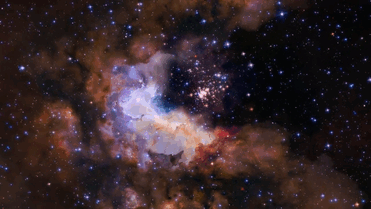
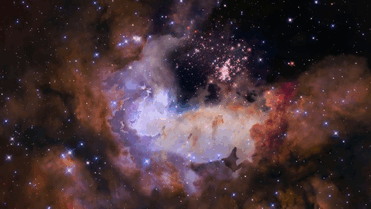
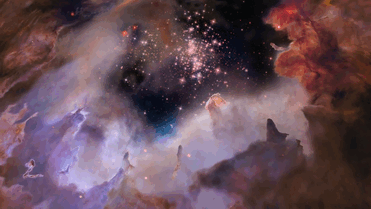
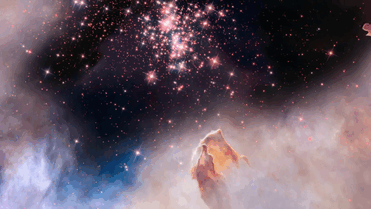
Celestial Fireworks: Into Star Cluster Westerlund 2
What if you could go directly to a cluster where the stars are forming? This animation was done with 3D computer modeling of the region around the star cluster Westerlund 2, based on Hubble Space Telescope images in visible and infrared light. Westerlund 2 covers about 10 light-years and is about 20 thousand light years distant towards the constellation Keel of the ship (Carina). As the illustrative animation begins, the larger Gum 29 nebula fills the screen with the young group of bright stars visible in the center. Stars pass your finger as you approach the cluster. Soon, your imaginary vessel rotates and you pass over the interstellar gas and dust pillars during the light year. Strong winds and radiations from young, massive stars destroy all but the densest clumps of dust, leaving these pillars in their shadows - many pointing back to the center of the cluster. Lastly, you move to the top of the set of stars and search hundreds of the most gigantic stars known.
Credit: NASA, ESA, Hubble, J. Anderson et al. (STScI); Acknowledgment: The Hubble Heritage Team (STScI/AURA), A. Nota (ESA/STScI), the Westerlund 2 Science Team, and the ES
🍂🍁🏔️🌨️🌌

Mark Basarab

Puraten10 on Instagram
What's Up - December 2017
What’s Up For December? Geminid and Ursid meteor showers & winter constellations!

This month hosts the best meteor shower of the year and the brightest stars in familiar constellations.

The Geminds peak on the morning of the 14th, and are active from December 4th through the 17th. The peak lasts for a full 24 hours, meaning more worldwide meteor watchers will get to see this spectacle.

Expect to see up to 120 meteors per hour between midnight and 4 a.m. but only from a dark sky. You’ll see fewer after moonrise at 3:30 a.m. local time.

In the southern hemisphere, you won’t see as many, perhaps 10-20 per hour, because the radiant never rises above the horizon.

Take a moment to enjoy the circle of constellations and their brightest stars around Gemini this month.

Find yellow Capella in the constellation Auriga.

Next-going clockwise–at 1 o'clock find Taurus and bright reddish Aldebaran, plus the Pleiades.

At two, familiar Orion, with red Betelguese, blue-white Rigel, and the three famous belt stars in-between the two.

Next comes Leo, and its white lionhearted star, Regulus at 7 o'clock.

Another familiar constellation Ursa Major completes the view at 9 o'clock.

There’s a second meteor shower in December, the Ursids, radiating from Ursa Minor, the Little Dipper. If December 22nd and the morning of December 23rd are clear where you are, have a look at the Little Dipper’s bowl, and you might see about ten meteors per hour. Watch the full What’s Up for December Video:
There are so many sights to see in the sky. To stay informed, subscribe to our What’s Up video series on Facebook. Make sure to follow us on Tumblr for your regular dose of space: http://nasa.tumblr.com.
-
 imaextragone reblogged this · 3 years ago
imaextragone reblogged this · 3 years ago -
 imaextragone liked this · 3 years ago
imaextragone liked this · 3 years ago -
 hliofos liked this · 4 years ago
hliofos liked this · 4 years ago -
 tormentacosmicaazul liked this · 4 years ago
tormentacosmicaazul liked this · 4 years ago -
 leben-heute2020 liked this · 4 years ago
leben-heute2020 liked this · 4 years ago -
 aziliyae-blog liked this · 4 years ago
aziliyae-blog liked this · 4 years ago -
 elusivelittleredfox liked this · 4 years ago
elusivelittleredfox liked this · 4 years ago -
 stephysalcido liked this · 4 years ago
stephysalcido liked this · 4 years ago -
 dragonsoulbabe liked this · 4 years ago
dragonsoulbabe liked this · 4 years ago -
 u-wi reblogged this · 4 years ago
u-wi reblogged this · 4 years ago -
 lady-nightmares-blog reblogged this · 4 years ago
lady-nightmares-blog reblogged this · 4 years ago -
 laxersposts reblogged this · 4 years ago
laxersposts reblogged this · 4 years ago -
 nebula52 liked this · 4 years ago
nebula52 liked this · 4 years ago -
 soft--starlight reblogged this · 4 years ago
soft--starlight reblogged this · 4 years ago -
 misterfixit64 liked this · 4 years ago
misterfixit64 liked this · 4 years ago -
 backlovefuck liked this · 4 years ago
backlovefuck liked this · 4 years ago -
 layenico liked this · 4 years ago
layenico liked this · 4 years ago -
 panterae reblogged this · 4 years ago
panterae reblogged this · 4 years ago -
 ghostlineage liked this · 4 years ago
ghostlineage liked this · 4 years ago -
 pakizasana666 liked this · 4 years ago
pakizasana666 liked this · 4 years ago -
 i-curse-the-blue-skies liked this · 5 years ago
i-curse-the-blue-skies liked this · 5 years ago -
 vytashuth liked this · 5 years ago
vytashuth liked this · 5 years ago -
 salayaah reblogged this · 5 years ago
salayaah reblogged this · 5 years ago -
 mizlaurenalexis reblogged this · 5 years ago
mizlaurenalexis reblogged this · 5 years ago -
 starfire56 reblogged this · 5 years ago
starfire56 reblogged this · 5 years ago -
 starfire56 liked this · 5 years ago
starfire56 liked this · 5 years ago -
 stickysandwichsheep liked this · 5 years ago
stickysandwichsheep liked this · 5 years ago -
 acedia-me liked this · 5 years ago
acedia-me liked this · 5 years ago -
 yaoigirl09 liked this · 5 years ago
yaoigirl09 liked this · 5 years ago -
 dangara2610 liked this · 5 years ago
dangara2610 liked this · 5 years ago -
 nerpafied liked this · 5 years ago
nerpafied liked this · 5 years ago -
 fanartofthelostcities liked this · 5 years ago
fanartofthelostcities liked this · 5 years ago -
 kool-bi-69 liked this · 5 years ago
kool-bi-69 liked this · 5 years ago -
 notisaidthechicken liked this · 5 years ago
notisaidthechicken liked this · 5 years ago -
 desertflowerus liked this · 5 years ago
desertflowerus liked this · 5 years ago -
 writeronthego liked this · 5 years ago
writeronthego liked this · 5 years ago -
 mr80james liked this · 5 years ago
mr80james liked this · 5 years ago -
 crossbonescat liked this · 5 years ago
crossbonescat liked this · 5 years ago -
 catclawwss liked this · 5 years ago
catclawwss liked this · 5 years ago -
 fagdykefrank liked this · 5 years ago
fagdykefrank liked this · 5 years ago
My ambition is handicapped by laziness. -C. Bukowski Me gustan las personas desesperadas con mentes rotas y destinos rotos. Están llenos de sorpresas y explosiones. -C. Bukowski. I love cats. Born in the early 80's, raised in the 90's. I like Nature, Autumn, books, landscapes, cold days, cloudy Windy days, space, Science, Paleontology, Biology, Astronomy, History, Social Sciences, Drawing, spending the night watching at the stars, Rick & Morty. I'm a lazy ass.
222 posts